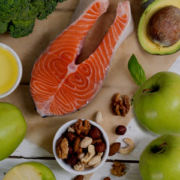Fertility Supplements
Most essential nutrients can be found in food sources. However, there are some nutrients that are hard to obtain through diet or higher levels are needed to increase fertility and deal with hormone imbalance and potential birth defects. These include:
- Ubiquinol supplements are the best way to obtain CoQ10, which improves eggs and sperm health.
- Folic acid. 400mg of folic acid is essential to prevent spinal cord defects to the baby. Ideally, you start with folic acid supplements prior to your pregnancy.
- Multivitamins including iron, folate, vitamin C, vitamin E, vitamin B complex, zinc, and selenium will boost your general health and fertility
There are also other supplements that help control hormonal disorders or fertility issues. These include:
- Vitex is a complex herb that acts on the hormones of the hypothalamus, pituitary, and ovaries and helps to treat hormonal disorders, such as PMS and PCOS. However, as it is not FDA-approved, you should only take it under the guidance of an experienced physician.
- For women who experience short luteal phases, consider taking Optivite PMT or ProCycle PMS and increasing the consumption of fish oil.
- For women with limited fertile cervical fluid, they should try primrose oil, FertileCM, Mucinex Expectorant (antihistamine- free), Guaifenesin Extended-Release 600 mg tablets (antihistamine-free), Robitussin (antihistamine-free) as they improve cervical fluid.
Reduce Stress
Stress is defined as a “response to a physical, mental, or emotional strain or tension (such as fear or pain), that disturbs or interferes with the normal physiological equilibrium of an organism”. Stress is the time when the body senses that conception should not occur and instead prevents it to protect both mother and child. Symptoms can include sleeplessness, irritability, restlessness or nervousness. Unfortunately, these are the same symptoms that may occur when you are having difficulty getting pregnant. There are many stress-reduction techniques that can suit everyone, ranging from meditation, yoga, and reading to hiking, and exercise!
Exercise & Body Weight
Being obese or overweight can lead to increased estrogen production, while being too thin may stop ovulation altogether! Ideally, you should have a BMI of around 20-24 and a body fat it the mid 20’s and make sure you exercise regularly. According to a 2017 systematic review, a vigorous exercise of 30-60 min daily can reduce the risk of anovulatory infertility.
Rest
It is vital to achieving an uninterrupted 8 hours of sleep each night! Try completely removing any source of light, as this will help you relax and sleep better and fix any menstrual cycle problems, from short luteal phases to irregular periods.
Sex
The source of fertility problems is equally divided between men and women, making the evaluation of male fertility equally important to the evaluation of the female when conception is not occurring. A man’s sperm is considered normal if his ejaculate contains at least 20 million sperm per millimeter and if the total number of sperm is at least 250-300 million.
If the man’s sperm count is normal
- Have sex every day from the day you have wet cervical fluid or a lubricative vaginal sensation, through and including the day of the first rise of temperature. The closer the intercourse takes place to your Peak day, the higher the chances of conception!
If the man’s sperm count is low
For the first few months, you should try having sex every day that you have eggwhite cervical fluid. But if that does not work, you might want to try having sex every other day. Men with low sperm count need more time to produce a higher count of more fertile sperm, which can be achieved by abstinence from ejaculation until your cervical fluid becomes slippery. Some tips to follow:
- Have sex every day from the day you have wet cervical fluid, until and including the day of the first rise of temperature.
- Have sex every other day from the day you have wet cervical fluid, until and including the day of the first rise of temperature.
- Have sex every other day from the day you have eggwhite cervical fluid, until and including the day of the first rise of temperature.
- If you only have 2 days of fertile cervical fluid, abstain the first day and have sex on the Peak day.
What to Avoid
- Eliminate caffeine, nicotine, alcohol and junk food. A proper diet is essential for increasing fertility, hormone balance, and achieving a healthy pregnancy.
- Avoid unnecessary medication and drugs including OTC’s. According to a study published in the British Medical Journal, women who took aspirin, antacids, dextroamphetamine, phenobarbital, sodium amytal, other barbiturates, cough medicines, excessive iron, sulphonamides, and nicotinamide had more chances of having babies with birth defects compared to women who did not take any medication.
- Stay away from xenohormones. Xenohormones are chemicals that can disrupt your hormones. These include parabens, which can be found in shampoos, cosmetic products, and even food and drinks! Furthermore, flexible plastic often contains phthalates, an additional hormone disruptor! Make sure to read the labels of your everyday products and avoid xenohormones.
- Avoid exposure of testes to excessive heat (hot tubs and laptop computers, tight underwear), bicycling, etc.
Ideal Foods for Fertility Boost
• Eggs (vitamin D, B12, protein),
• Walnuts, flax seeds, hemp seeds,
• Chia seeds (omega 3), Pumpkin & sesame seeds (Zinc, Iron),
• Sunflower seeds & almonds (Vitamin E),
• Grass-fed meat (Omega 3, Iron, B12, Protein),
• Spinach, Swiss chard, kale & collards (Iron, Folic acid, B6, Vitamin E),
• Raw prunes, pomegranates, raisins,
• Blueberries & strawberries (Vitamin C, Flavonoids, Variety of antioxidants),
• Colorful veggies (Vitamins C, B6, A),
• Cold-water fish and Shell Fish (Vitamin D, Omega 3, Zinc, Selenium, B12, CoQ10),
• Liver (Vitamin D, Zinc, Selenium, Iron, Folic Acid, B12, CoQ10),
• Lentils, garbanzo, pinto beans (Iron, Folic Acid),
• Raw or cultured dairy (Vitamin D, B12, Zinc).





